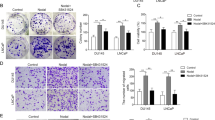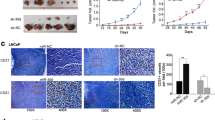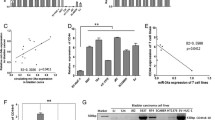Abstract
Background
Angiogenesis is a critical biological process essential for solid cancer growth and metastasis. It has been shown that microRNAs (miRNAs) play a vital role in a variety of biological processes in cancers. However, whether miR-130b is involved in prostate cancer angiogenesis remains ill-defined.
Methods
We performed the miRNA microarray to analyze miRNA expression in human prostate cancer specimens. In vitro gain-of-function assays and loss-of-function assays were conducted to explore the potential functions of miR-130b in human prostate cancer cells. Correlation analysis and dual-luciferase reporter assay were performed to validate whether tumor necrosis factor-α (TNF-α) was a direct target of miR-130b. The Matrigel plug and tumor vascular imaging assays were performed to confirm the anti-angiogenic activity of miR-130b in nude mice.
Results
We found that miR-130b was one of the miRNAs being most significantly downregulated. Subsequently, we found that miR-130b expression was markedly downregulated in human prostate cancer cell lines. Down-regulation of miR-130b in prostate cancer cells significantly promoted the proliferation, invasion and tubule formation of human umbilical vein endothelial cells (HUVECs), while ectopic expression of miR-130b blocked prostate cancer angiogenesis in vitro and in vivo. Mechanistic analyses indicated that tumor necrosis factor-α (TNF-α) was regulated by miR-130b directly. MiR-130b attenuated nuclear factor-κB (NF-κB) signaling and its downstream gene vascular endothelial growth factor-A (VEGFA) by directly inhibiting TNF-α expression. Additionally, subsequent investigations identified that the ectopic level of VEGFA markedly abrogated the anti-angiogenic effect induced by miR-130b. Interestingly, VEGFA could in turn decrease the expression of miR-130b, thus forming a negative feedback loop that drives the angiogenesis of prostate cancer.
Conclusion
These findings show that miR-130b/TNF-α/NF-κB/VEGFA feedback loop is significantly correlated with angiogenesis in prostate cancer and miR-130b could be regarded as potential therapeutic target for prostate cancer anti-angiogenesis treatment.






Similar content being viewed by others
Abbreviations
- miRNAs:
-
MicroRNAs
- TNF-α:
-
Tumor necrosis factor-α
- NF-κB:
-
Nuclear factor-κB
- HUVECs:
-
Human umbilical vein endothelial cells
- UTRs:
-
Untranslated regions
- CM:
-
Conditioned medium
- CCK-8:
-
Cell counting kit-8
- RT-PCR:
-
Reverse transcription polymerase chain reaction
- wt:
-
Wild type
- mut:
-
Mutant
- EMSA:
-
Electrophoretic mobility shift assay
- VCAM-1:
-
Vascular cell adhesion molecule-1
- ICAM-1:
-
Intracellular adhesion molecule-1
References
Scher HI, Solo K, Valant J, et al. Prevalence of prostate cancer clinical states and mortality in the United States: estimates using a dynamic progression model. PLoS One. 2015;10(10):e0139440.
Owens OL, Jackson DD, Thomas TL, et al. Prostate cancer knowledge and decision making among African-American men and women in the Southeastern United States. Int J Men’s Health. 2015;14(1):55–70.
Pellegrini KL, Sanda MG, Patil D, et al. Evaluation of a 24-gene signature for prognosis of metastatic events and prostate cancer-specific mortality. BJUI. 2017;119(6):961–7.
Rycaj K, Li H, Zhou J, et al. Cellular determinants and microenvironmental regulation of prostate cancer metastasis. Semin Cancer Biol. 2017;44:83–97.
Ci X, Xing C, Zhang B, et al. KLF5 inhibits angiogenesis in PTEN-deficient prostate cancer by attenuating AKT activation and subsequent HIF1α accumulation. Mol Cancer. 2015;14:91.
Walter BA, Valera VA, Pinto PA, et al. Comprehensive microRNA profiling of prostate cancer. J Cancer. 2013;4(5):350–7.
Khanmi K, Ignacimuthu S, Paulraj MG, et al. MicroRNA in prostate cancer. Clin Chim Acta. 2015;451:154–60.
Li Q, Lu S, Li X, et al. Biological function and mechanism of miR-33a in prostate cancer survival and metastasis: via downregulating Engrailed-2. Clin Transl Oncol. 2017;19(5):562–70.
Du Z, Sun T, Hacisuleyman E, et al. Integrative analyses reveal a long noncoding RNA-mediated sponge regulatory network in prostate cancer. Nat Commun. 2016;7:10982–10982.
Liu A, Hou C, Chen H, et al. Genetics and epigenetics of glioblastoma: applications and overall incidence of IDH1 mutation. Front Oncol. 2016;6:16.
Ali Hosseini Rad SM, Bavarsad MS, Arefian E, et al. The role of microRNAs in stemness of cancer stem cells. Oncol Rev. 2013;7(1):e8.
Shahjahani M, Khodadi E, Seghatoleslami M, et al. Rare cytogenetic abnormalities and alteration of microRNAs in acute myeloid leukemia and response to therapy. Oncol Rev. 2015;9(1):261.
Dong P, Karaayvaz M, Jia N, et al. Mutant p53 gain-of-function induces epithelial–mesenchymal transition through modulation of the miR-130b-ZEB1 axis. Oncogene. 2013;32(27):3286–95.
Yip L, Kelly L, Shuai Y, et al. MicroRNA signature distinguishes the degree of aggressiveness of papillary thyroid carcinoma. Ann Surg Oncol. 2011;18(7):2035–41.
Zhao G, Zhang JG, Shi Y, et al. MiR-130b is a prognostic marker and inhibits cell proliferation and invasion in pancreatic cancer through targeting STAT3. PLoS One. 2013;8(9):e73803.
Zhao Yanyang, Miao Gang, Li Yao, et al. MicroRNA-130b suppresses migration and invasion of colorectal cancer cells through downregulation of integrin β1. PLoS One. 2014;9(2):e87938.
Duan J, Zhang H, Qu Y, et al. Onco-miR-130 promotes cell proliferation and migration by targeting TGFβR2 in gastric cancer. Oncotarget. 2016;7(28):44522–33.
Li S, Geng J, Xu X, et al. miR-130b-3p modulates epithelial–mesenchymal crosstalk in lung fibrosis by targeting IGF-1. PLoS One. 2016;11(3):e0150418.
Chen Q, Zhao X, Zhang H, et al. MiR-130b suppresses prostate cancer metastasis through down-regulation of MMP2. Mol Carcinog. 2015;54(11):1292–300.
Sun Y, Jia X, Hou L, Liu X. Screening of differently expressed miRNA and mRNA in prostate cancer by integrated analysis of transcription data. Urology. 2016;94(313):e1–6.
Ramalhocarvalho J, Graca I, Gomez A, et al. Downregulation of miR-130b~301b cluster is mediated by aberrant promoter methylation and impairs cellular senescence in prostate cancer. J Hematol Oncol. 2017;10:1–43.
Lin J, Cao S, Wang Y, et al. Long non-coding RNA UBE2CP3 enhances HCC cell secretion of VEGFA and promotes angiogenesis by activating ERK1/2/HIF-1α/VEGFA signalling in hepatocellular carcinoma. J Exp Clin Cancer Res. 2018;37(1):113.
Xu S, Bai J, Zhuan Z, et al. EBV–LMP1 is involved in vasculogenic mimicry formation via VEGFA/VEGFR1 signaling in nasopharyngeal carcinoma. Oncol Rep. 2018;40(1):377–84.
Cui J, Gong C, Cao B, et al. MicroRNA-27a participates in the pathological process of depression in rats by regulating VEGFA. Exp Ther Med. 2018;15(5):4349–55.
Thawan R, Thomas A, Thakur K. Tracheomediastinal fistula: rare complication of treatment with bevacizumab. Cureus. 2018;10(4):e2419.
Ham B, Fernandez MC, D'Costa Z, et al. The diverse roles of the TNF axis in cancer progression and metastasis. Trends Cancer Res. 2016;11(1):1–27.
Luo W, Tweedie D, Beedie SL, et al. Design, synthesis and biological assessment of N-adamantyl, substituted adamantyl and noradamantyl phthalimidines for nitrite, TNF-α and angiogenesis inhibitory activities. Bioorg Med Chem. 2018;26(8):1547–59.
Sun H, Zhu X, Zhou Y, et al. C1q/TNF-related protein-9 ameliorates Ox-LDL-induced endothelial dysfunction via PGC-1α/AMPK-mediated antioxidant enzyme induction. Int J Mol Sci. 2017;18(6):E1097.
Tang N, Ma J, Wang KS, et al. Dihydromyricetin suppresses TNF-α-induced NF-κB activation and target gene expression. Mol Cell Biochem. 2016;422(1–2):11–20.
Li J, Ma J, Wang KS, et al. Baicalein inhibits TNF-α-induced NF-κB activation and expression of NF-κB-regulated target gene products. Oncol Rep. 2016;36(5):2771–6.
Acknowledgements
We are grateful to Dr An Liu (Yueyang, China) for his generous support.
Author information
Authors and Affiliations
Corresponding author
Ethics declarations
Conflict of interest
The authors declare that they have no competing interests.
Ethics statement
This study was approved by the medical ethics committee of The Second Affiliated Hospital & Yuying Children’s Hospital of Wenzhou Medical University, and all the participants signed written informed consent forms.
Additional information
Publisher's Note
Springer Nature remains neutral with regard to jurisdictional claims in published maps and institutional affiliations.
Rights and permissions
About this article
Cite this article
Mu, H.Q., He, Y.H., Wang, S.B. et al. MiR-130b/TNF-α/NF-κB/VEGFA loop inhibits prostate cancer angiogenesis. Clin Transl Oncol 22, 111–121 (2020). https://doi.org/10.1007/s12094-019-02217-5
Received:
Accepted:
Published:
Issue Date:
DOI: https://doi.org/10.1007/s12094-019-02217-5




